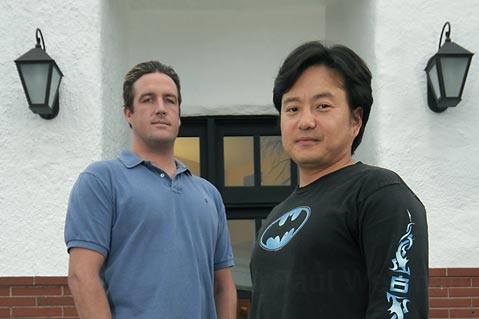Suing the City
Facing Closure, Pot Shop Challenges Ordinance Revisions

In the eyes of the city, there’s only 68 feet separating the owners of Green Well from running a legitimate medical marijuana dispensary and operating an illegal enterprise. And while the Milpas Street storefront had previously been on the safe side of a 500-foot buffer zone mandated by city ordinance between pot shops and schools, regulation changes adopted five weeks ago — including increasing the gap to 600 feet — left Green Well high-and-dry as it’s only 532 feet away from Santa Barbara Junior High School.
After it became clear that the new mandates, which also include limiting the number of city dispensaries to three, would put Green Well owners Nat Reinke and James Lee out of business, the two have explored possible legal action. On Monday, Reinke and Lee filed a lawsuit in Santa Barbara Superior Court charging that the city’s decision to grow the buffer was “arbitrary, capricious, and lacking in rational basis” and that the revised ordinance is therefore illegal as it applies to Green Well and should be set aside. The lawsuit also calls for an injunction on the November ballot initiative that would potentially ban all dispensaries in the city.
Citing a lack of any evidence that shows 600 feet protects kids any more than 500 feet does, the lawsuit claims “a deliberate intent to shut down the Green Well” is the only rational explanation for the change. By all accounts, Reinke and Lee have run a tight ship since they opened on January 5, avoiding any formal complaints or negative attention as they’ve built a patient base.
Drafted by a San Francisco-based lawyer who specializes in land use cases, the suit argues that because Reinke and Lee sunk $400,000 dollars into their 500 North Milpas Street property to meet Dispensary Permit requirements, and because they’ve reportedly acted in good faith (taking on serious liabilities and expenses in the process), the two have garnered a “fundamental vested right” to the property. That right, though, is being blatantly trampled upon by the city, according to the document, despite Green Well’s total compliance, as well as community outreach efforts and donations to area nonprofits. To placate school officials’ concerns that older teens might find it too easy to swing by the shop and fill their prescription vials, the document also notes, Reinke and Lee voluntarily agreed not to sell to anyone younger than 20 years old.
A purported lack of just compensation is also raised in the filing. Calling “grossly inadequate” the 180-day period in which newly illegal pot shops are allowed to continue operating before they have to pack it in, the suit says Green Well is entitled to a cash judgment should it go under, which would include out-of-pocket expenses, attorneys fees, and — most importantly — a yet-to-be-determined figure of how much the shop stood to make over the course of its potentially eight-year lease. (Lee and Reinke signed a four-year lease with the option of a four-year extension that would end in January 2017.)
To Reinke, his and Lee’s complaint is rooted more in a sense of unfairness than in a desire to recoup lost income. “There’s just the unjustness of it all,” he said. “We wouldn’t be going after the city if it was just about the paycheck.” Reinke has expressed pessimism in the past about the legitimacy of ordinance drafting processes, saying decisions are based solely on political considerations and without citizens’ best interests in mind. “What I’ve learned is that permits are meaningless,” Reinke said in a previous interview. “You can do everything anyone asks, but when the political winds shift, you’ll be hung out to dry.” The original Dispensary Permit, he also noted, did not include any stipulation that would allow the city to revoke or impose further conditions.
Reinke pointed to a clause in the suit that alleges Green Well has been unfairly singled out, explaining that of the three existing dispensaries operating with city permits, only Pacific Coast Collective at 331 North Milpas Street would be allowed to keep its doors open despite the fact that it’s seen its fair share of criminal investigations. Reinke also said he’s heard the city intends to give the go-ahead to two dispensaries — Santa Barbara Patients’ Group and Compassion Center of Santa Barbara County — that have been operating without permits for years.
Ironically, it was Councilmember Das Williams — one of the council’s most ardent dispensary supporters — who proposed increasing the buffer requirement that led to Green Well’s undoing. Councilmember Grant House was the only one to vote against the proposed changes, specifically citing Green Well’s predicament. City attorney Steve Wiley could not be reached for comment as of press time.



